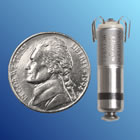|
FDA Panel to Look At Data on Medtronic's Miniature Leadless Micra® Pacing System
|
 |

Micra Pacemaker compared to a Nickel |
January 29, 2016 (updated February 10) -- Medtronic plc announced today that it will present data on its Micra® miniaturized leadless pacemaker to the FDA's Circulatory System Devices Panel on February 18. The Micra gained the CE Mark European approval in April and Medtronic has presented data in support of the Micra's safety and efficacy at several meetings, most recently at the American Heart Association meeting in November, with simultaneous publication of the results in the New England Journal of Medicine.
The February FDA Panel meeting is not being billed as a recommendation for approval of the Micra, but as a fact-finding meeting about this new type of miniaturized, leadless, transcatheter device to determine, among other things, the acceptability of adverse event rates in acute and chronic timeframes, indications for use, given the availability of other technologies with different adverse event profiles, the type and length of training that will be required, and the necessary elements that need to be included as measures in postapproval studies.
Although the Micra is leading adoption in Europe, a competing device, the Nanostim™ leadless pacemaker from St. Jude Medical, has also been approved there (sales of the Nanostim were halted for a short time last year on safety concerns). Data for both the Micra and Nanostim devices will be reviewed during the FDA panel. Meetings materials have now been posted on the FDA Circulatory System Devices Panel's web site.
Both of these capsule-sized devices are 1/10 the size of a standard pacemaker and both are "leadless"; that is, they are designed to work directly inside the heart's chamber, eliminating the need for electrical wire leads, which have been the nexus for corrosion, complications, device failures and recalls. Nor do they require a surgical incision in the chest. They are delivered to the chamber of the heart by catheter via the body's circulatory system.
The video below, supplied and produced by Medtronic, demonstrating how the Micra is implanted.
|
Video not loaded
|
| The Micra™ Transcatheter Pacing System
|
This morning's press release from Medtronic follows:

Medtronic to Present Data on Micra® Transcatheter Pacing System at Upcoming FDA Advisory Committee Meeting
January 29, 2016 -- Dublin -- Medtronic plc (NYSE: MDT) will present data on the world's smallest pacemaker, the Micra® Transcatheter Pacing System (TPS), at the U.S. Food and Drug Administration (FDA) Circulatory System Devices Panel of the Medical Devices Advisory Committee on Feb. 18, 2016, in Gaithersburg, Maryland. According to the FDA, the committee will meet to discuss and make recommendations on clinical trial research, post-approval study design, and physician training requirements for leadless cardiac pacemaker device technology.
The Micra TPS is less than one-tenth the size of traditional pacemakers and cosmetically invisible, yet provides the most advanced pacing technology available. It is implanted directly into the heart and does not require the use of wires ("leads") to deliver pacing therapy, thereby reducing potential sources of complications seen with conventional pacing systems.
Results from the Micra TPS Global Clinical Trial recently were published in the New England Journal of Medicine and presented during a late-breaking Special Report at the 2015 American Heart Association Scientific Sessions. In the clinical data presentation, the MicraTPS was successfully implanted in nearly all patients (99.2 percent) and exceeded safety and effectiveness endpoints with wide margins. Most patients (96 percent) with the Micra device experienced no major complications; there were no (0) dislodgments, no (0) systemic infections, and very few (0.4 percent) revisions (meaning extraction, repositioning or replacement). Major complications included cardiac injuries (1.6 percent), complications at the groin site (0.7 percent) and pacing issues (0.3 percent).
The study included a comparison of Micra TPS safety performance to a pre-defined, historical control group consisting of more than 2,500 patients who received conventional pacing systems. Compared to patients with conventional pacing systems, the patients in the Micra trial were older and had more comorbidities, yet had fewer major complications.
In the United States, the Micra TPS is an investigational device and not yet approved for commercial use.
For more information about the FDA panel meeting, visit: http://www.fda.gov/AdvisoryCommittees/Calendar/ucm476987.htm.
In collaboration with leading clinicians, researchers and scientists worldwide, Medtronic offers the broadest range of innovative medical technology for the interventional and surgical treatment of cardiovascular disease and cardiac arrhythmias. The company strives to offer products and services that deliver clinical and economic value to healthcare consumers and providers around the world.
About Medtronic
Medtronic plc (www.medtronic.com), headquartered in Dublin, Ireland, is among the world's largest medical technology, services and solutions companies - alleviating pain, restoring health and extending life for millions of people around the world. Medtronic employs more than 85,000 people worldwide, serving physicians, hospitals and patients in approximately 160 countries. The company is focused on collaborating with stakeholders around the world to take healthcare Further, Together.
Any forward-looking statements are subject to risks and uncertainties such as those described in Medtronic's periodic reports on file with the Securities and Exchange Commission. Actual results may differ materially from anticipated results.
Reported by Burt Cohen, January 29, 2016 (updated February 10 with links to FDA meeting materials and info on NanoStim) |

